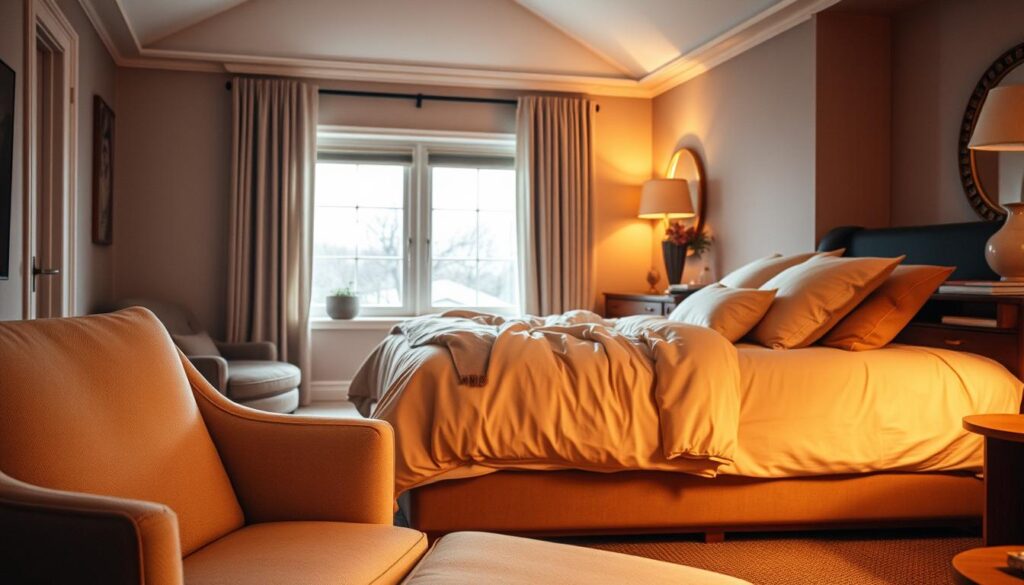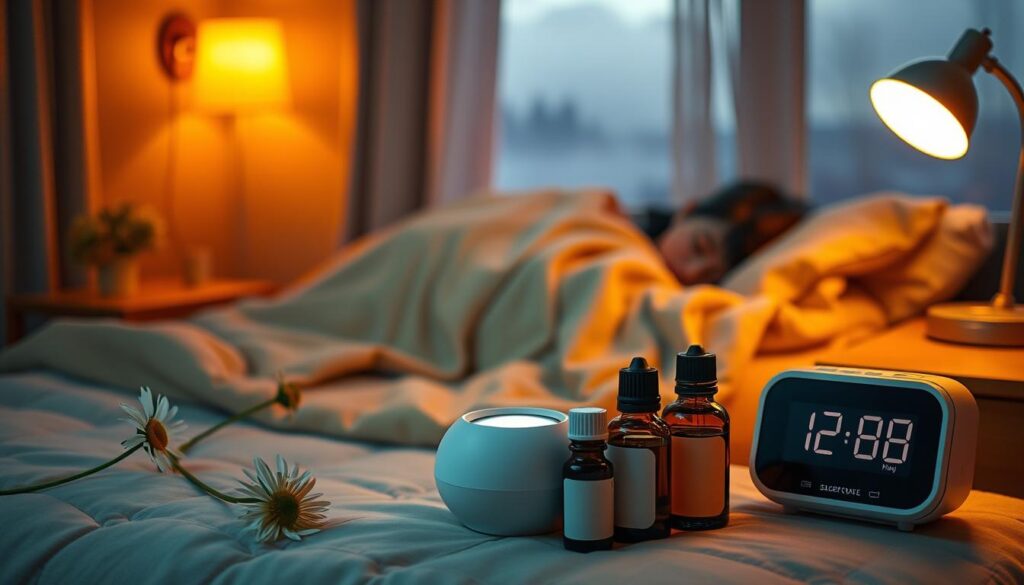Sleep deprivation can severely harm our mental and physical health. When we don’t rest enough, our brain doesn’t work right. This can lead to anxiety, depression, and a weakened immune system.
Getting enough sleep is key for our well-being. Sleep helps keep our heart healthy and our mood stable. It also improves our brain function.
Many things can cause sleep deprivation. Lifestyle and environment play big roles. Knowing how sleep affects us can help us stay healthy.
Introduction to Sleep Deprivation
Sleep deprivation can greatly impact our daily lives. It affects our mental and physical health. Understanding sleep deprivation is crucial for a healthy life.
Key Takeaways
- Sleep deprivation can cause mental health effects such as anxiety and depression
- Physical health effects of sleep deprivation include a weakened immune system and cardiovascular problems
- Sleep plays a vital role in maintaining our overall health and well-being
- Understanding the causes and consequences of sleep deprivation can help prevent it
- Maintaining a healthy sleep routine can reduce the risk of sleep deprivation and its effects on mental and physical health
- Sleep deprivation can have long-term consequences on our health if left unaddressed
Understanding the Silent Impact of Sleep Deprivation
Sleep deprivation affects our daily lives in big ways. It impacts our physical and mental health. When we don’t get enough sleep, our bodies try to make up for it by changing our sleep cycles. This leads to many negative effects.
Factors like poor sleep habits, irregular work schedules, and medical conditions cause sleep deprivation. These disrupt our natural sleep cycles. Understanding the science behind sleep cycles and the causes of sleep deprivation helps us fight it. This way, we can improve our health.
To tackle sleep debt and avoid sleep deprivation, we need to adopt healthy sleep habits. This includes keeping a regular sleep schedule and creating a calm sleep environment. By focusing on sleep and managing sleep deprivation causes, we can sleep better. We’ll wake up feeling more refreshed.
The Hidden Toll on Your Mental Health
Sleep deprivation can really hurt your mental health effects. It can make you feel more anxious and lead to insomnia. Without enough sleep, our brains struggle to control our emotions. This can cause mood swings and irritability.
Studies show that not sleeping enough changes our brain’s chemistry. This affects mood-regulating neurotransmitters like serotonin and dopamine. This imbalance can lead to anxiety and depression. So, getting enough sleep is key for our mental health.
Here are some signs of sleep deprivation on mental health:
- Mood swings and irritability
- Increased anxiety and stress
- Difficulty concentrating and making decisions
- Feeling overwhelmed and hopeless
To avoid long-term mental health damage, we must tackle insomnia and sleep deprivation. A consistent sleep schedule and a calming bedtime routine help. Also, avoid caffeine and electronics before bed to improve sleep quality.
By focusing on sleep and managing anxiety and insomnia, we protect our mental health. This leads to a happier, healthier life.
Physical Health Consequences You Can't Ignore
Sleep deprivation can severely harm our bodies. It weakens our immune system, making us more likely to get sick. Sleep is key for making cytokines, proteins that fight infections.
Not getting enough sleep can also hurt our cardiovascular health. It can lead to high blood pressure, heart attacks, and strokes. Sleep helps control stress hormones like cortisol, which can raise blood pressure and heart rate. It also affects hormones that help us feel full or hungry.
- Weakened immune system
- Cardiovascular health problems
- Weight management issues
- Increased risk of chronic diseases, such as diabetes and cancer
It’s crucial to make sleep a priority. By getting enough rest, we can avoid these health issues. This helps us stay healthy and feel our best.
The Connection Between Sleep and Anxiety
Sleep and anxiety are closely linked. Insomnia is a common symptom of anxiety disorders. Not getting enough sleep can harm our mental health, making anxiety worse. This creates a cycle that’s hard to break.
Research shows sleep deprivation affects our mental health. It can increase anxiety and depression symptoms. People with anxiety disorders often have sleep problems like insomnia. This shows why treating sleep issues is key in anxiety treatment.
To end this cycle, we must focus on sleep and anxiety management. We can do this by setting a regular sleep schedule, having a calming bedtime routine, and doing stress-reducing activities like meditation or yoga. By tackling sleep and anxiety together, we can boost our mental health and well-being.
Here are some strategies for managing sleep and anxiety:
- Establishing a consistent sleep schedule
- Creating a relaxing bedtime routine
- Engaging in stress-reducing activities
- Seeking professional help if symptoms persist
By taking a holistic approach to sleep and anxiety, we can better our mental health. Remember, sleep is vital for our health and well-being. Addressing sleep issues is crucial for managing anxiety and other mental health conditions.
Essential Oils for Insomnia and Anxiety: Natural Solutions for Better Sleep
Many people struggle with insomnia and anxiety. Finding good solutions can be hard. Luckily, essential oils offer a natural way to help. These oils come from plants and have been used for centuries to treat health issues, including sleep problems.
Studies have found that some essential oils can improve sleep by reducing anxiety. Lavender, chamomile, and bergamot are among the best oils for sleep. You can use them in different ways, like through a diffuser, on your skin, or by inhaling them, to help you sleep better.
Benefits of Essential Oils for Sleep
- Reduce anxiety and stress levels
- Promote relaxation and calmness
- Improve sleep quality and duration
When using essential oils for insomnia and anxiety, it’s important to use them correctly. For example, applying a few drops of lavender oil to your skin or using a diffuser before bed can help you sleep well.
Top Essential Oils for Sleep Enhancement
Besides lavender, chamomile, and bergamot, valerian root, sandalwood, and ylang-ylang are also great for sleep. You can use these oils alone or together to make a calming space for a good night’s sleep.
Creating Your Perfect Sleep Environment
A well-designed bedroom design can greatly impact your sleep quality. To create the perfect sleep environment, consider the lighting, temperature, and noise level in your bedroom. A dark, quiet, and cool room can help promote better sleep. Investing in blackout curtains, earplugs, or a white noise machine can be beneficial.
When it comes to bedroom design, think about the overall aesthetic you want to achieve. A calming color scheme, comfortable bedding, and minimal clutter can help create a relaxing atmosphere. You can also incorporate plants, such as lavender or jasmine, which are known for their calming effects.

In addition to the physical space, your sleep environment also includes the habits and routines you practice before bed. Avoid screens and electronic devices at least an hour before bedtime, and try to establish a consistent sleep schedule. By creating a sleep-conducive environment and developing healthy sleep habits, you can improve the quality of your sleep and wake up feeling rested and refreshed.
Some other tips to enhance your sleep quality include:
- Investing in a comfortable mattress and pillows
- Avoiding heavy meals and caffeine before bedtime
- Practicing relaxation techniques, such as deep breathing or meditation
By prioritizing your sleep environment and making a few simple changes to your daily routine, you can significantly improve the quality of your sleep and overall well-being.
The Science Behind Aromatherapy and Sleep
Aromatherapy is becoming more popular in sleep science. It works by using essential oils to affect our brain and body. This helps improve our sleep quality.
Studies show aromatherapy can help with sleep. It reduces stress and anxiety, making it easier to fall asleep. Oils like lavender and chamomile are especially good because they calm our brain chemistry.
- Reduced stress and anxiety
- Improved mood and relaxation
- Enhanced sleep quality and duration
- Natural and non-invasive
Adding aromatherapy to our bedtime routine can greatly improve our sleep. We can use essential oils in diffusers, apply them to our skin, or breathe them in. This way, aromatherapy can help us get better sleep.
Developing a Healthy Sleep Routine
Creating a consistent sleep routine is key for good sleep habits. It tells your body it’s time to sleep, making it easier to fall and stay asleep. Start by setting a regular sleep schedule and keep it, even on weekends.
It’s also important to make your bedroom sleep-friendly. Keep it cool, dark, and quiet. Get a comfy mattress and pillows. Relaxation techniques like deep breathing or meditation can also help you relax before bed. A good sleep routine can make your sleep better, leading to better health.
Here are some tips for a healthy sleep routine:
- Go to bed and wake up at the same time every day.
- Avoid caffeine and electronics before bed.
- Do relaxing activities before bed, like reading or a warm bath.
By focusing on a healthy sleep routine, you can sleep better and wake up feeling great. A regular sleep schedule is vital for good sleep habits and overall health.
Common Sleep Disorders and Natural Remedies
Sleep disorders can really affect your life, making you tired, moody, and less productive. Insomnia, sleep apnea, and restless leg syndrome are common issues. For insomnia, natural fixes like relaxation, mindfulness meditation, and cognitive-behavioral therapy can help.
Looking into natural remedies is key for those with sleep disorders. Here are some effective ones for insomnia:
- Keep a regular sleep schedule
- Make your sleep area calm
- Stay away from caffeine and screens at night
- Try yoga or deep breathing to reduce stress
Sleep apnea can be managed with lifestyle changes and devices like CPAP machines. Restless leg syndrome can be eased with exercise, massage, and relaxation methods.
Understanding sleep disorders and trying natural remedies is a good start. But, always talk to a doctor for the right diagnosis and treatment. They can guide you to the best natural remedies.

| Sleep Disorder | Prevalence | Natural Remedies |
|---|---|---|
| Insomnia | 30-50% of the general population | Relaxation techniques, mindfulness meditation, cognitive-behavioral therapy |
| Sleep Apnea | 2-4% of the general population | Lifestyle changes, oral appliances, CPAP machines |
| Restless Leg Syndrome | 5-10% of the general population | Regular exercise, massage, relaxation techniques |
When to Seek Professional Help
Dealing with sleep disorders can be tough and lonely. If you’re having trouble sleeping, knowing when to get help is key. Sleep specialists offer valuable advice and support to help you beat sleep disorders and sleep better.
Signs you might need professional help include trouble sleeping, feeling tired all day, and mood swings. If you’re seeing these signs, talk to a healthcare expert. They can give you a proper diagnosis and a treatment plan. Sleep specialists can find out why you’re struggling and create a plan just for you.
Common sleep disorders like insomnia, sleep apnea, and restless leg syndrome need professional attention. These issues can really affect your health and happiness. By getting help from sleep specialists, you can tackle these problems and sleep better.
If you’re fighting sleep disorders, don’t be afraid to ask for help. The right support can help you beat these issues and sleep well again. Remember, asking for help is brave, not weak. It’s the first step to better sleep and a healthier life.
Getting professional help for sleep disorders has many benefits. These include:
- Personalized treatment plans
- Improved sleep quality
- Increased energy and productivity
- Enhanced overall health and wellbeing
The Role of Diet and Exercise in Sleep Quality
A good night’s sleep is key for health and happiness. Diet and exercise greatly impact sleep quality. Eating well and staying active can boost sleep, while bad habits can harm it.
Some foods can help you sleep better. Sleep-promoting foods like tart cherries, walnuts, and fatty fish can regulate sleep. Also, eating light meals before bed and avoiding caffeine and sugar can help.
Nutrition and Sleep
Eating a balanced diet with whole foods supports better sleep. Important nutrients for sleep include:
- Vitamin B6
- Magnesium
- Potassium
Exercise Timing for Better Rest
Exercise can enhance sleep, but avoid intense workouts close to bedtime. Instead, try yoga or stretching to relax before bed.
Conclusion: Your Path to Restorative Sleep
Learning about sleep health is key to feeling your best. Understanding how restorative sleep affects your mind and body helps you improve your sleep. Your sleep wellness is a journey, and with the right steps, you can enjoy better sleep.
Try natural remedies like essential oils and make your bedroom sleep-friendly. Also, stick to a routine that matches your body’s natural sleep cycle. By focusing on sleep health, you’ll see big improvements in your mood, thinking, and energy. Start this journey with courage and kindness to yourself, and you’ll find the magic of a good night’s sleep.
